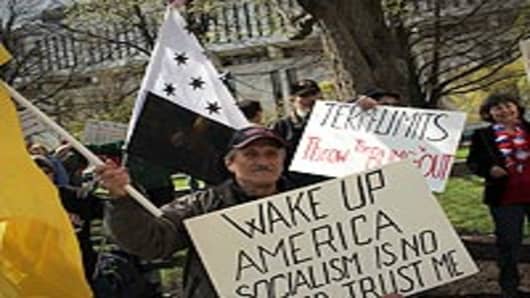"Tea parties" have played a role in knocking out some incumbents in primary elections around the country and if the current trend continues, they'll have an impact on policy in November. Investors should start to think of how this might affect their portfolio, especially with markets currently offering discounts on shares.
Drill, Baby, Drill. The popularized slogan came about in the 2008 election and the BP disaster has not deterred supporters of greater oil exploration production and drilling in the United States. Supporters aren't just looking to drill for energy, though; they'll also be happy to go nuclear.
Investors should anticipate a kitchen sink approach to energy that'll be good news for natural gas, nuclear and oil. Alternative energy won't suffer, but it's unlikely that spending on subsidies would increase. Coal already has done well politically and while it's unlikely to be punished, it's also unlikely to see much upside generated from DC.
The plays here would be:
- iShares Dow Jones U.S. Oil Equipment ,
- First Trust ISE Revere Natural Gas and
- Market Vectors Nuclear .
Shrinking deficits. Spending is under assault from both parties and that is good news for bond prices. You don't have to wait until November to see the results from the shift in public opinion, 30-year Treasurys are yielding less than 4 percent. There are plenty of reasons not to love U.S. Treasuries, but there's one good reason to like them: they're going up in value.
Lower deficit spending should lead to slower economic growth at first, but the cuts could make investors believe that the US government isn't going to spend itself into bankruptcy. Slow economic growth and financial prudence can result in low yields far longer than people expect.
The most volatile play is a long-term Treasury ETF such as iShares Barclays 20+ Year Treasury , with volatility decreasing along with maturity.
No bailouts. Bailouts are unpopular and there won't be another one unless the economy turns very sour. That's bad news for the housing industry, which benefited from the home buyer tax credits. Fannie Mae and Freddie Mac are also likely to see their operations more tightly regulated, which could lead to higher mortgage rates.
It's also bad news for the too-big-to-fail banks who received government cash, but probably good news for the smaller community banks.
Finance and '1776' Plays
Avoid iShares Dow Jones U.S. Home Construction , and go for SPDR KBW Regional Bank ETF for a play in finance.
Health care repeal. Many activists call for the repeal of the healthcare legislation passed earlier this year. Support for the law remains weak, but it has been rising and is now about even with opposition. Considering health care reform passed despite more voters opposing it, it's also likely that the bill would be repealed even if a majority favor it by next year, should candidates running on repeal win in November. However, President Obama won't sign a repeal of his signature legislation. Therefore, unless something develops on this front, there's unlikely to be much change.
Defense. This one is a tough call. Some observers consider the tea party as a right-wing movement, which should be positive for defense spending. But others claim the membership is more diverse and that could mean the Pentagon would be on the table for budget cuts. With two wars ongoing and deficits at the top of voters' concerns, there doesn't seem to be much upside for this budget.
Overall, the tea party movement appears to have a laser focus on spending. A 10-point "Contract From America" lists six spending issues, for instance. Given the amount of effort and focus, if they are able to achieve anything it will be on the issue of spending and deficits.
What Would George Washington Buy?
At the time of the original tea party, there were no ETFs to invest in, but with Independence Day this past weekend, I wondered what a portfolio of the Founding Fathers might look like if they could invest in ETFs.
- iPath Dow Jones-UBS Coffee Subindex Total Return ETN . The original tea party involved dumping a load of tea owned by the British East India Company into Boston harbor. British taxes and embargos later made it more expensive for Americans to drink and the Continental Congress declared coffee the national drink.
- SPDR Gold Shares and iShares Silver Trust . If there's one thing the Founders were terrible at, it was printing money. They flooded the economy with Continental currency to finance the war, leading to hyperinflation. American colonists needed gold and silver if they wanted to be sure of making a purchase. "Not worth a Continental" was a phrase used to describe something as worthless.
- Claymore/Delta Global Shipping . More than a few revolutionaries were smugglers evading British taxes and many fortunes were made in the industry during the early days of the Republic.
- Market Vectors Agribusiness . Most Americans were farmers until the end of the 19th Century, and about 20 percent of jobs were in agriculture at the start of the Great Depression. Westward expansion was carried out by eastern farmers and immigrants looking for cheap land.
- iShares MSCI France . France would have been a bad investment given that the French state was bankrupted by its support for the American colonists.
Finally, they would no doubt have liked to place some leveraged inverse bets on the British market, but anti-British sentiment has waned in the US. Currently, there are no inverse ETFs or ETNs for the British stock market or the British pound.
______________________________
Disclosures:
In addition to writing ETF Action, Don Dion is president and founder of Dion Money Management, a fee-based investment advisory firm to affluent individuals, families and nonprofit organizations, where he is responsible for setting investment policy, creating custom portfolios and overseeing the performance of client accounts. At the time of publication, Dion Money Management owned IAU.


